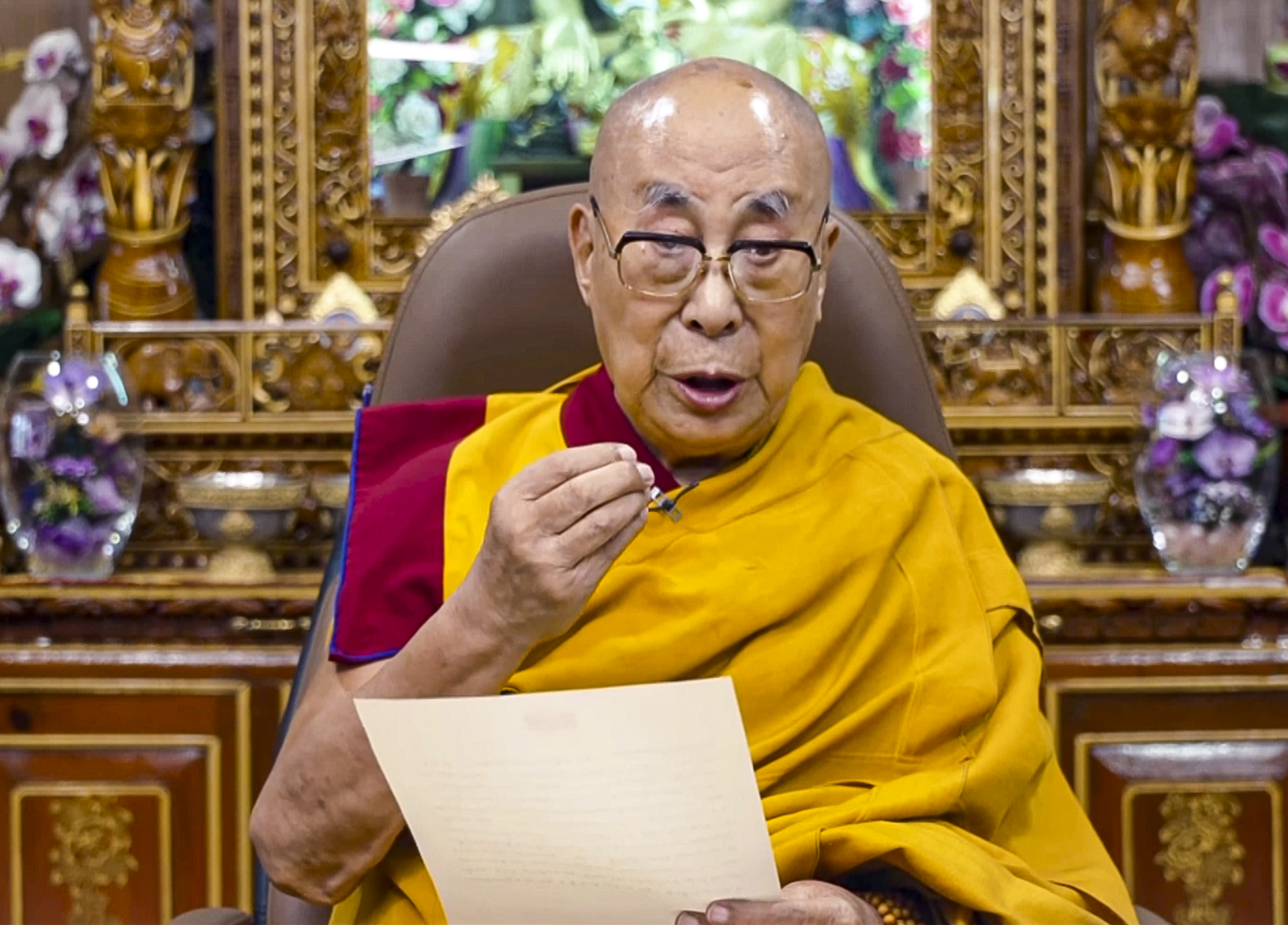China rejects the Dalai Lama's succession plan, insists his heir requires its approval
The Tibetan spiritual leader said the institution of the Dalai Lama will continue and only the Gaden Phodrang Trust will have the authority to recognise the future reincarnation, ending speculation whether he will have a successor or not after his death.
PTI
-
Tibetan spiritual leader Dalai Lama
Beijing, 2 July
China on Wednesday rejected the Dalai Lama's
succession plan, insisting that any future heir must receive its seal of
approval, adding a new chapter to Tibetan Buddhism's decades-long struggle with
the Chinese ruling Communist Party.
The
Tibetan spiritual leader on Wednesday said the institution of the Dalai Lama
will continue and only the Gaden Phodrang Trust - founded by his office in 2015
- will have the authority to recognise the future reincarnation, ending
speculation whether he will have a successor or not after his death.
His
announcement ahead of his 90th birthday on Sunday is set to intensify tensions
with Beijing.
"The
Dalai Lama's reincarnation must follow the principles of domestic recognition,
the ‘Golden Urn’ process, and approval by the central government, in line with
religious traditions and laws,” Chinese Foreign Ministry spokeswoman Mao Ning
told a media briefing while responding to the Dalai Lama's announcement.
The
Dalai Lama caught the attention of the world following his high-profile
defection to India in 1959 with a large group of Tibetans after the Chinese
military under the command of Communist Party founder Mao Zedong took over
Tibet.
Since
then, he made Dharamsala his "adopted" home, which drew the ire of
Beijing and his presence there continued to be a bone of contention between
China and India, and the struggle for Tibetan autonomy may have to be continued
by his successor.
His
successor issue is also expected to flare up fresh tensions between Beijing and
Washington as China's policy comes in conflict with the US Tibetan Policy and
Support Act of 2020, which reaffirmed America's steadfast support for the Dalai
Lama and Tibetan Buddhism.
The
reincarnation of the Dalai Lama and Panchen Lama, the second-high priest of
Tibetan Buddhism, has to go through the centuries-old tradition of the Golden
Urn law procedure started by the 18th century Qing dynasty, Mao said.
The
current 14th Dalai Lama himself was recognised after his predecessor's death
following traditional rituals, but his recognition was granted directly by the
then-central government, exempting him from the Golden Urn process, Mao said.
She
also spoke about how the traditional ceremony was incorporated in 2007 into
China’s official regulations, along with a clause explicitly banning interference
by overseas individuals and parties.
Significantly,
the question and Mao's reply related to the Dalai Lama’s succession plan was
conspicuously missing from the official transcript of the media briefing posted
on the Chinese Foreign Ministry website on Wednesday.
Mao
also defended the “sinicisation” of Tibetan Buddhism and other religions under
the guidelines issued by Chinese President Xi Jinping.
“I
believe that sinicisation of religion is not about restricting religious
practice; rather, all religions must adapt to the social, cultural and
historical context of the country. Tibetan Buddhism in China is a prime example
of a religion that has integrated Chinese characteristics, exemplifying the
process of sinicisation,” Mao said.
In
New Delhi, China's Ambassador to India Xu Feihong said the practice of Living
Buddha reincarnation has continued for over 700 years and has formed rigorous
religious rituals and historical conventions.
"The
14th Dalai Lama himself was searched for in strict accordance with religious
rituals and historical conventions after the passing of the 13th Dalai Lama,
and enthroned after being granted exemption from the lottery with the then
central government's approval," he posted on X.
He
said the government of China implements a policy of freedom of religious
belief.
"It
protects the tradition of reincarnation of Living Buddhas in accordance with
the law. The reincarnation of the Dalai Lama must follow the process that
consists of search and identification in China, lot-drawing from the Golden
Urn, and central government approval, and comply with religious rituals and
historical conventions as well as Chinese laws and regulations," he added.
The
Dalai Lama is revered by the vast majority of over six million Tibetans as a
living manifestation of Chenrezig, the Buddhist god of compassion. He is
regarded as the most consequential spiritual leader of Tibetan Buddhism as
unlike his predecessors he had to confront the atheist regime headed by the
Communist Party of China.
A
commentary on the Dalai Lama’s succession carried by state-run Xinhua news
agency Tuesday ruled out official recognition without proper rituals.
Any
so-called "reincarnation" that bypasses traditional religious
rituals, whether conducted within or outside the Chinese territory, lacks
religious legitimacy and will by no means be recognised by Tibetan Buddhist
followers, it said.
Notably
ahead of the much-expected announcement by the Dalai Lama, China-appointed
Panchen Lama, the second most important Buddhist monk in Tibet after the Dalai
Lama, met President Xi on 6 June and swore his loyalty to the ruling
Communist Party.
Meeting the Panchen Lama, Xi asked him to make greater contributions to promoting ethnic unity and religious harmony, as well as the stability, development and progress in the Tibet Autonomous Region.
Beijing
has in the past accused the Dalai Lama of indulging in "separatist"
activities and trying to split Tibet and considers him as a divisive figure.
However, the Nobel Peace Prize-winning spiritual head of Tibetan Buddhism has insisted that he is not seeking independence but "genuine autonomy for all Tibetans living in the three traditional provinces of Tibet" under the "Middle-Way approach".
Leave a Reply
Your email address will not be published. Required fields are marked *










.jpg)
.jpg)
 (1).jpg)
.jpg)
.png)
.png)

.jpg)
.jpg)
.jpg)
